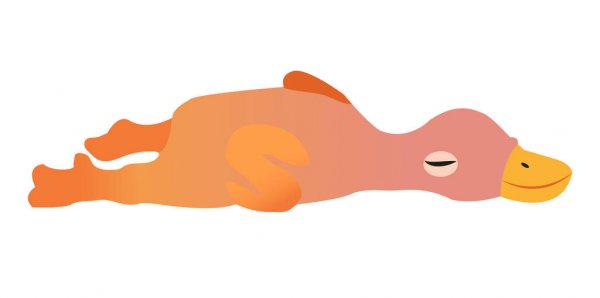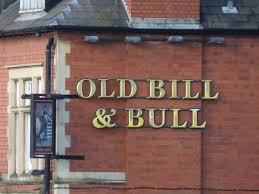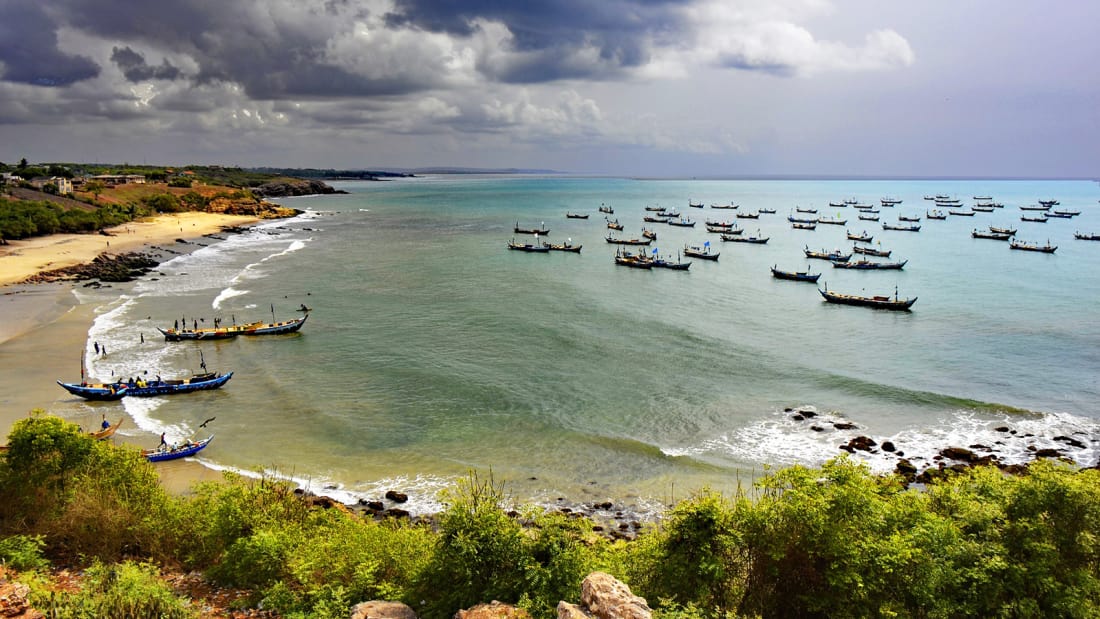The following true story was written by a Dutch friend of mine. His English is not very good so there might some mistakes 😉 But the story is so well written that it is too nice not to be told. Here we go…
It took a while when I got off the plane in Accra. It had been nine years since I had visited the continent and although I am a dyed African traveler, the first impressions still hit me raw on the roof. First of all, the languid heat that covers the city like a damp blanket, exacerbated by the Harmattan, the desert wind blowing from the north, which clouds the sky with dust and makes the sun pale. And then the first taxi ride through the city that led through slums because the driver tried to avoid the ever-crowded junctions of this chaotic metropolis. Shelters built of wood and chipboard, goats and dogs scurrying around in the dust with rubbish everywhere and a pungent sewage smell. Men hanging around, with all kinds of women hauling on their heads and everywhere, really everywhere, children running around in the gang. What a difference with Buenos Aires where I enjoyed my trip so relaxed last year … And soon I had only one thought. Away from this city and on to the coast to relax after the trip and to acclimatize in peace. It turned out to be a golden choice because the beaches of the former Gold Coast colony are so beautiful to frame and, as far as I am concerned, they are the top attraction in the country. Especially around Cape Three Points, the very southern tip of the country, there are beautiful, wide, golden sandy beaches, flanked by coconut trees, while the high waves crashing hard on the coast made swimming enjoyable and sometimes exciting. I was taken a few times and dragged along by such a wave, only to recover on the beach, spluttering and panting.
After a week I managed to withdraw from this piece of paradise with difficulty for a trip to Mole, a national park located in the north of the country, according to experts one of the best opportunities in West Africa for wildlife viewing on a large scale. see. It turned out to be quite a disappointment. Some gazelles, some crocodiles, some monkeys and an elephant. Many bird species but all in all and certainly compared to Southern and East Africa a joke. Due to a lack of money and mismanagement, only five percent of the park has been developed for tourism, causing the remaining parts to fall prey to decay and poaching. It is a cheap park because for three euros you can already make a walking safari, accompanied by a guide, and Mole Motel, located in the park, made a lot with its swimming pool and its location (a beautiful view over some watering holes for animals). good for the disappointed nature lover. If you travel north you will pass through a number of different climate zones. In general the following applies: The further you go from the coast, the drier it gets. Due to the virtually lack of relief, the rides in buses and tro-tro’s (as the minibuses are called here) became a relatively boring affair. Yet the adventure is just around the corner because the rattles you occasionally travel in can make a trip very amusing but also a true hell. Of course, they do everything they can to fill the second-hand discarded items purchased from us in the Netherlands or Germany as full as possible with people and luggage, which does not always benefit my legroom.
I have sometimes wondered why those Ghanaians and Nigerians buy up all those bricks of ours, but now I fully understand. What is really no longer possible with us will continue for good and can last for years. During an hour and a half ride I had to get out eight times. four times to fill the radiator under my seat with water and four times to fill the jerry can standing next to my feet with water from a trickle somewhere along the road. The driving antics of the drivers also make your heart beat faster many times. It’s somewhere near the coast. An ordinary ride on a well-paved road with lush bushes, banana trees and coconut palms on either side. When we come through a bend, we see a truck at about a hundred meters. The flames appear, somewhere behind the cabin, and the next moment the realization hits. Holy shit, it’s a tanker. Fortunately, the driver immediately drops anchors and together with another tro-tro we stop for a while and see how a guy jumps out of the truck and starts to hit the flames with a jacket or a rug. When that thing takes to the air, I change my mind, then…. So I start talking to the driver. Pull back, pull back, let’s get out of here. Other passengers also contribute and the driver throws the car in reverse to get off the road immediately. We scrub along bushes and he is forced to drive forward again. A second attempt to reverse straight also ends in a shallow ditch and I quickly get out. If I do have to die, then at least not because my driver cannot drive. I sprint away with my hand luggage and see how four or five other vehicles are turning in front of me to escape the possible crash site as quickly as possible. Moments later my minibus also arrives. The third attempt to reverse apparently succeeded. Then I see a car coming from the other side. A tro-tro that must have just passed the scene of the disaster and behind it comes a land rover.
Our tro-tro remains level and the driver accelerates a little later. What to do now? Obey the eagerly gesticulating young driver’s assistant who normally collects the passengers’ money or lets the car go, including my backpack? Hesitantly, I take a few steps forward and then sprint to jump into the moving bus a little later. When we are back around the corner I see the truck again. It still smokes quite a bit, but the vicious flames from just now have disappeared. The whole bus holds its breath as we drive past the truck where the driver is looking glumly next to it with a blackened cloth in his hands. Everyone knows if that thing blows up, we won’t survive. A little later we drive again on the well-paved road with lush bushes, banana trees and coconut palms on both sides and it is as if nothing happened. Ghanaians are friendly. The many peoples and tribes scattered throughout the country are, with the exception of a few, equally accommodating and considerate towards the tourist. I think there are few countries in Africa where you can travel as relaxed as here, which is a great country to start traveling on this continent. And that is exactly what happens to the mostly young volunteers who have just left secondary school or third and fourth year students. By studying or working in orphanages and hospitals with a holiday attached to them, they soak up the typically African atmosphere for the first time. I have never been to a country where so many people work for all kinds of good causes or charity projects or construction work. At least ninety percent of the “tourists” turned out to be working in the country for three months or sometimes even a year and I soon became fascinated by their experiences, impressions and stories.
Because the stories of the girls, who are usually around twenty, from the Netherlands, Denmark, Germany and other Western European countries and a few boys, did not lie. Many of the stories of those working in the orphanages turned out to be disturbing and sometimes even shocking. Mismanagement, exploitation of the volunteers and total neglect of the orphans turned out to be the rule rather than the exception. A director who misappropriates money and / or never shows himself, a manager who knocks down goods to sell them on the local market. Staff who let loose or who don’t care about the children at all. Dirty toilets with the shit on the walls and crawling vermin and of course a lot of sick, sometimes very sick, “orphans”.
By the way, yes, because most children in these orphanages still have a mother or both parents. In Ghana it is very easy to dump your children at an “orphanage” because the parents cannot (or do not want to?) Take care of them. A Dutch told the story of a mother who arrived with a pregnant belly at the orphanage where she had already kept three of her children. Elated, she announced that the orphanage could soon look forward to the arrival of a fourth child. Every week, some new “orphanages” seem to open their doors in this country. Many a clever entrepreneur can already see the golden mountains in front of them because there are always a few idealistic Westerners or devout European religious groups who want to help the poor souls in Africa out of need. I think Europe would do better to remind the Ghanaian government of its legal responsibilities, but of course that falls on deaf ears. The governments addicted to our “emergency aid” would be crazy to stop this flow of money. This story fits in perfectly with a whole series of staggering abuses that Linda Polman manages to analyze so flawlessly in her illustrious book “De Crisikaravaan”. Shortly before departure I received the book as a present from a friend and I can wholeheartedly recommend that anyone with a little interest in development aid matters to read it.
Traveling around Ghana, I get an image of stagnation. And to think that this country is considered a beacon of development for West Africa with economic growth and stable governance. Especially compared to many other so-called third world countries where I have traveled in recent years, I find the performance poorly compared. While countries like Peru and Brazil are undergoing a visible development, not to mention the countries in Southeast Asia, (with one exception), the vast majority of the population in Ghana still seems to live the same way as ten years ago. Unpaved roads, dirt and dust, lack of water, sewage and (often) electricity and almost everywhere the absence of the internet. Although this is readily available in the cities, use is limited to an upper class of the population because most simply cannot afford an hour on the web. In rural areas and small towns, there is hardly any internet to be found. Many men hang around blankly or play a game of cards under a tree. I can still see the picture of the village of Larabanga near the entrance of Mole National Park. As I walked out of the village I met dozens of women who had just come from the well, toiling with bowls of water on their heads or two jerry cans in their hands, some with babies on their backs. When I turned around I was still stared at by the men sitting on rickety benches in front of their houses. You will only be a woman on this continent. Destined to toil for a lifetime and in the meantime defecate another child or six, seven, eight. Ghana also seems to be at the forefront of population growth in Africa, I was told by some. That is to say, there is not as extreme population growth in Ghana as in many other countries, but the fact that too many children are joining here seems clear to me. Nevertheless, the children are and remain one of the great attractions on this continent. With their playfulness, spontaneity and zest for life, they turn many village and city walks into a festive event.
In addition to the many orphanages, there is also a real proliferation in another area. One church after another opens its doors in this religion-drenched country. Especially in the Christian south you stumble over the congregations and sectarian denominations. Shops often have beautiful names such as the “Jesus loves you hairdresser” or the “God is watching you bakery”. In a van I saw a sticker saying “This car is powered by God” and a day later I saw one driving by with a bumper sticker that said “Insulated by the blood of Jesus”. In the many denominations it is occasionally rough. Often I have walked past churches where the whole congregation was swinging to heavy music and during the prayer the pastor occasionally goes so wild that half of the audience whines with the stories about how sinful and bad we are. sinners are not. On an ordinary Monday evening in the coastal town of Cape Coast, I stopped in the doorway of a church to look at the crazy situation in which the approximately fifteen churchgoers were. The pastor was wailing and murmuring into a microphone, another lay on the floor floundering with their eyes turned away, three or four were speaking in tongues, two boys let out monotonous cries while the rest were silent on their bellies the ground. When I walked on after a few minutes I couldn’t suppress a resentment. What are those guys doing? It is pure escapism, a tool for fleeing from the harsh everyday life. But of course you can also approach it from a positive side. Perhaps it is a blessing to go out of your mind every day, if only for a while, and forget the daily hassle. I can’t help but think of that famous one-liner by old Karl Marx: “Religion is the opium of the people.” In the town of Bole I ended up in a party where I got to talk to a chief from a village in the area. He was a Christian himself but did not have a good word to say about this new lightening. He was pleased with the Catholic and Anglican Churches. At least there was still talk of organization and control, but in all those new sects all kinds of well-spoken guests made clever use of the needs and beliefs of the (mostly female) followers. The money that these disciples are asked to donate they put in their own pocket and they behave like potentates in their own kingdom.
After two weeks of traveling around, I returned to Accra purified. Where at first I only wanted to leave, I now felt at home and walked in a good mood along the busy, exhaust-smelling streets looking for a place to stay. Not with the intention to stay there long, because Accra is far from suitable for that. Besides, I still have a bit more to do. In my return overland to the Netherlands I will have to squeeze through at least ten countries. First to Togo and Benin and then via Niger (?) And Burkina Faso to Mali. And then up to Spain via Senegal, Mauretania and Morocco. In short: “It’s time to move on”.
Lomé, Togo
Credits: “André de Jong – February 2011”












Thank you André, It was well worth it. I enjoyed reading this very much. Well written with style and humor. Making me wish I was there to experience it.